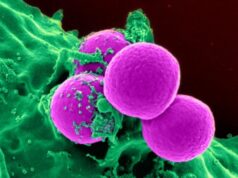The fat that builds up deep in the abdomen—more than any other type of body fat—raises the risk of insulin resistance and type 2 diabetes. Researchers have known that abdominal fat becomes dangerous when it becomes inflamed but have had a hard time determining what causes the inflammation.
A new study at Columbia University Irving Medical Center (CUIMC) has revealed that at least one of the culprits for this mysterious inflammation comes from the liver. The researchers found that, in obese mice, the liver increases its production of an enzyme called DPP4. This enzyme travels through the blood stream to abdominal fat. Once inside fat tissue, DPP4 helps to activate inflammatory cells.
The good news is that this inflammation can be soothed by turning off DPP4 production in the liver, as the researchers demonstrated in mice. And even though the animals remained obese, soothing inflamed abdominal fat improved their insulin resistance.
Additional, unpublished data suggests the pathway also exists in people.
“If we can develop ways to target liver DPP4 in people, this may be a powerful new way to treat obesity-induced type 2 diabetes,” said study leader Ira Tabas, MD, PhD, the Richard J. Stock Professor of Medicine at Columbia University Vagelos College of Physicians and Surgeons. “Inhibiting DPP4 specifically in liver cells attacks insulin resistance—the core problem of type 2 diabetes—at least in our preclinical models.”
Find your dream job in the space industry. Check our Space Job Board »
The study by Tabas’s team—including lead author Devram Ghorpade, PhD, associate research scientist, and co-corresponding author, Lale Ozcan, MD, assistant professor of medical science—was published online today in Nature.
Current DPP4 inhibitors do not reduce inflammation in fat or improve insulin resistance
Many patients with type 2 diabetes are given oral DPP4 inhibitors (known as gliptins) to help manage their disease. These drugs lower blood sugar by preventing DPP4 from interfering with a hormone that stimulates insulin production. But surprisingly, these drugs had no effect on inflammation in the abdominal fat of obese mice, the researchers found.
“Gliptins inhibit DPP4 in the blood and so they should, in theory, prevent fat inflammation,” Tabas said, “but we didn’t find that in our study.”
The reason for this shortcoming of gliptins, Tabas believes, may be related to their effects in the gut versus the liver. “DPP4 inhibitors lower blood sugar by inhibiting DPP4 in the gut. But we have some evidence that DPP4 inhibitors in the gut also end up promoting inflammation in fat. That cancels out the anti-inflammatory effects the drugs may have when they reach inflammatory cells, called macrophages, in the fat.”
When the researchers selectively blocked DPP4 production inside liver cells, they were able to reduce fat inflammation and improve insulin resistance, while also lowering blood sugar.
The findings suggest that DPP4 inhibitors could be more potent if they were redirected to liver cells and away from the gut.
Delivering DPP4 inhibitors directly to the liver
In theory, current DPP4 inhibitors could potentially be redirected by packaging the drug into nanoparticles that are delivered to the liver. However, the CUIMC team is studying an alternate approach that uses small interfering RNAs (siRNAs)—snippets of genetic material that silence particular genes—to turn off liver cell DPP4. To ensure that the siRNAs reach the appropriate target, they could be attached to certain sugars with a specific affinity for liver cells, Tabas said.
A complementary approach would be to block DPP4 activity in the macrophages of abdominal fat. “From our studies, we know that DPP4 interacts with a molecule on these cells to increase inflammation. If we could block that interaction, we might be able stop the enzyme from causing inflammation and insulin resistance,” Tabas said.
“This study reveals a potential new target for the treatment of type 2 diabetes and cardiometabolic disorders,” said Ahmed A Hasan, MD, PhD, a medical officer and program director in NHLBI’s Atherothrombosis & Coronary Artery Disease Branch, who serves as the project officer for the study grant. “These findings may pave the way for a future clinical trial to test whether a new treatment approach based on this target could improve insulin resistance in diabetic patients. More research is needed.”
Provided by:
Columbia University Medical Center
More information:
Hepatocyte-Secreted DPP4 in Obesity Promotes Adipose Inflammation and Insulin Resistance. Nature (2018). nature.com/articles/doi:10.1038/nature26138
Image:
Credit: CC0 Public Domain











